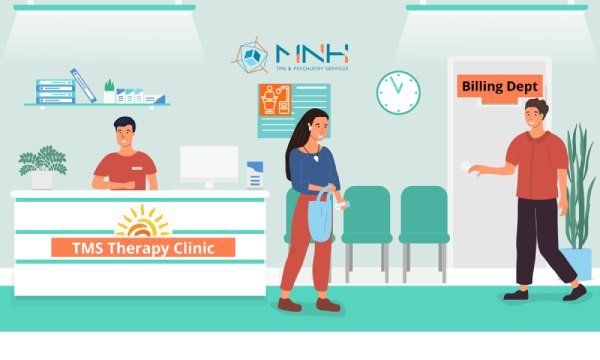2022 TMS Therapy & Psychiatry Billing Clarified
TMS Therapy Billing - The Art and Science of Effective TMS Billing
There is no doubt there is an art and science to TMS therapy billing. If you are reading this article you are likely having issues with TMS therapy billing or are thinking of starting a TMS clinic and just doing your due diligence before getting started. Perhaps you offer TMS billing services and are struggling with overturning denied claims.
The most important thing in TMS billing is having an astute knowledge of the entire patient intake process. This starts with the benefits and eligibility check. Unfortunately, without this knowledge it would be quite difficult to determine the reason for denial or overturn a denied claim. There are a few articles online that discuss TMS billing. Unfortunately, regardless of how modern the technique for billing may be, if you don’t fully understand all of the intricate details of the patient intake process, your will have difficulty with collecting on denied claims.
Metro NeuroHealth TMS & Psychiatry Services (MNH) is the only TMS therapy billing service provider in the U.S. that has hands-on experience in the TMS clinic setting. This is an absolute must to fully understand the entire process and effectively overturn denied claims. Missing any of the steps during the patient intake process can wreak havoc on your billing and can leave your patient footing the bill for their entire treatment. MNH specializes in TMS billing, credentialing, patient intake, and start up training for providers all across the U.S. Our team of TMS billing specialist fully understands every intricate step of the patient intake process and the impact it

has on billing and claims denials. In 2021, our rate of collections for all billed claims was 96%, and for TMS therapy billing, this speaks volumes regarding the experience and training of our staff.
Our team of collections specialists have encountered 100’s of reasons for denials. So, while it would be impossible to address all of the reasons for denied TMS claims, we can certainly share some insight on how to avoid some of the most common errors as they relate to the patient intake process.
The TMS Patient Intake Process
The TMS patient intake process plays a vital role in TMS therapy billing. The process begins with the TMS consultation visit. For some clinics the consultation visit is performed by the technician or other staff, and in other clinics it is done by the provider. Either way, this visit should include the following:
1 - A thorough history of the patient’s history as it relates to depression with the following minimum information collected from the patient:
- Initial diagnosis
- History of medication trials, including doses and approximate start and stop dates
- History of psychotherapy, including duration, frequency, and provider details
- Evaluation for any contraindications to TMS therapy
2 - Completion of a Request for Medical Records that should include:
- The patient’s pharmacy
- Any previous provider who has prescribed psychiatric medications for the past 5 years
- Any therapist, counselor, psychologist the patient has seen in the last 5 years
3 - A medication checklist to assist the patient in recalling previous medication trials
In addition to the above, the patient would likely complete a TMS Registration Form, as well as other documents required for HIPAA purposes or otherwise. However, collecting the above bullet list of items will streamline the prior authorization process and assist with a timely submission to the payer network.
Verification of TMS Benefits and Eligibility
Verification of TMS benefits and eligibility can be a daunting process, as it must be done via phone. This process is very different than checking benefits for a regular patient visit for medication management, which can be performed through your billing system. Often times, deductible amounts for TMS treatment may not be applicable, and there are a number of things you will want to verify before ever starting treatment to ensure your claims are paid.
Metro NeuroHealth recommends verifying the following with every benefits and eligibility call.
- Ensure the patient’s policy has benefits for TMS therapy treatment.
- Request the patient (and family if applicable) deductible amount, copay or coinsurance, annual max out-of-pocket, and accumulations. All of this information will be necessary to determine the required Good Faith Estimate that you will need to provide to the patient.
- If you are told the deductible is not applicable or a TMS prior authorization is not required, never assume this information is correct. Metro NeuroHealth recommends that you call back a second time and reverify this information, and always keep good records of the date of your call, the name of the individual providing you the information, and a call reference number. This is your ammunition when a claim is denied.
- Obtain the plan name and payer ID for the specific TMS codes (90867, 90868, and 90869).
- Ensure the provider who will perform the mapping session is in-network with the EIN the claim will be billed under.
- Inquire about the process for submitting the prior authorization.
- Obtain the plan effective date, as this is important to know. If a patient’s plan will be changing before or during treatment, the prior authorization doesn’t automatically transfer to the new payer network. So, it would be wise to be sure and communicate this with your patient before starting treatment. Be sure to ask them to notify you if they anticipate any insurance plan changes during the course of treatment or before starting treatment and be proactive.
Requests for Medical Records
While a request for medical records may seem trivial, it is vitally important to the billing process. Oftentimes patients treated in TMS therapy clinics are not patients of the practice. Therefore, you don’t have any information on this patient other than your initial evaluation for TMS therapy. If a payer network requests for records before they pay a claim, you will likely not have any information to send. Further, these records are often needed to successfully submit a prior authorization. While it may slow the intake process down by a few days, it can also prove to be a vital step in the billing process and help to overturn denied claims in the long run. Thus, saving you the loss of thousands of dollars in the long run.
To avoid delays in getting medical records, try these handy tips:
- On your cover sheet let the provider you are requesting records from know why you need the records in a couple days. For example, “We are requesting medical records in an effort to obtain a prior authorization for TMS therapy treatment so that the patient can begin treatment next week. If you could please fax the patients records in the next couple of days to prevent delays in treatment, we would sincerely appreciate it. Please don’t hesitate to contact us with any questions.”
- If you don’t have the records within three days, Metro NeuroHealth recommends calling the provider to notify them of the sense of urgency. During this call, if you are needing specific information to submit a prior authorization, ask them to provide you the information over the phone to keep the process moving
- Always call the patients pharmacy to obtain the medication information needed for the TMS prior authorization rather than waiting on medical records.
Gathering Information and TMS Prior Auth Submission
It’s a good practice to have a TMS prior authorization template to use when collecting information to submit a prior authorization for TMS therapy treatment. While each payer network has their own set of basic or core criteria, each also has many branches that stem from that basic criteria that is not mentioned in the medical guidelines but may land you a denial. It’s important to know and understand each payer networks guidelines medical guidelines for transcranial magnetic stimulation.
The minimum information you will want to document includes all of the following:
- Diagnosis code (make sure it is a covered diagnosis, such as F33.2 or F32.2). Some insurances will reimburse for F33.1, and there are a few insurances that are now reimbursing for OCD, as well as the theta burst treatment protocol. But it’s important to know that the TMS system you are using is FDA-approved for OCD and theta burst, as well as the treatment protocol outlined in the medical policy guidelines
- Document any secondary diagnosis’ – understand that certain secondary diagnoses’ may disqualify your patient for TMS treatment (i.e., Bipolar disorder, SUD, Eating disorder, OCD, PTSD, seizure disorder, etc.). Every payer network is different. If a prior authorization for MDD treatment is denied due to a secondary diagnosis of OCD or PTSD, this can typically be overturned during the peer-to-peer with a clear explanation that the treatment is specifically being done for major depressive disorder with a thorough an explanation of medical necessity.
- Detailed information about the history of antidepressant medications (dose, dates of the trial, side effects, etc.)
- Detailed information about any augmentative medications (dose, dates of the trial, side effects, etc.)
- History of psychotherapy (who, where, duration, and frequency)
- Age of first diagnosis
Conclusion and Wrap Up
In addition to the above list, you will want to be sure your patient does not have anything in their medical records that contradicts the insurance medical guidelines for transcranial magnetic stimulation. If your request for a TMS prior authorization is denied, always ask why it was denied and schedule a peer-to-peer immediately. Some payer networks will give you a very short window of time to schedule the peer-to-peer.
There are a number of other things to consider when completing and submitting a prior authorization to help prevent denials. Metro NeuroHealth offers a
TMS prior authorization training course that details the entire patient intake and prior authorization process. Ready to learn more?
Contact team MNH today










